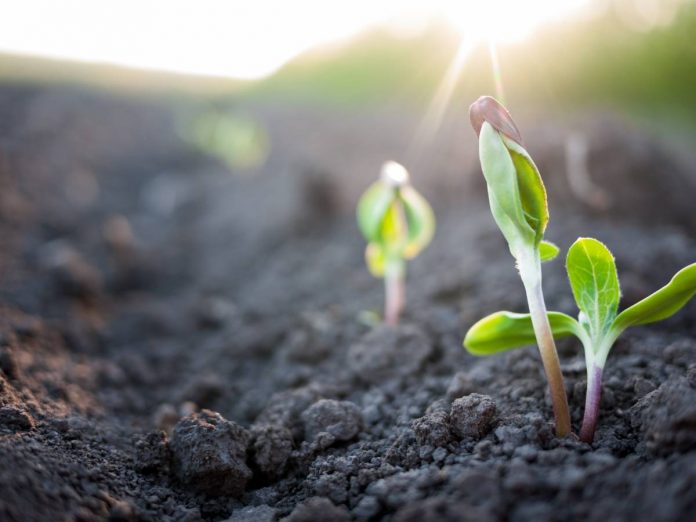
When you bite into broccoli or enjoy a handful of grapes, you’re probably thinking about how they taste or that you’re eating something nutritious. Yet the growing problem of soil depletion is robbing us of the nutrients in our food. What does soil depletion mean to you and your family and what can you do about it?
What is soil depletion?
Soil depletion is when the nutrients and other components that contribute to the vitality and fertility of soil are taken away and not replaced. You may think a handful of soil is little more than dirt, but it is often much more. In fact, a teaspoon of healthy soil can consist of more organisms than people living on the planet. According to Silvia Pressel, a researcher in the algae, fungi, and plants division at the National History Museum in London, soils can contain “millions of things people won’t be able to see like micro-organisms and all the fascinating work they do together.”
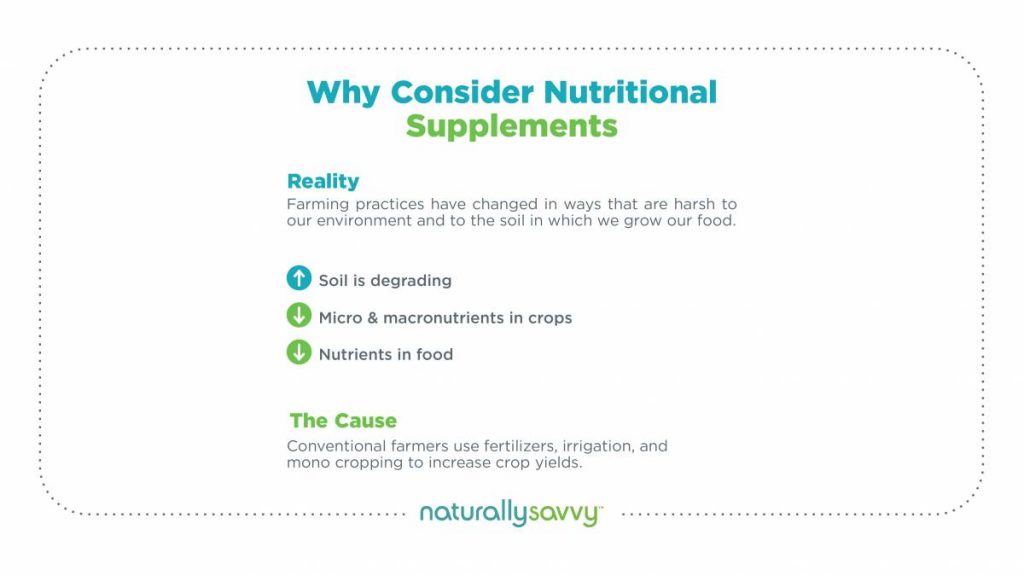
Depletion of soil can occur for a number of reasons, including soil erosion, excessive cultivation, and poor soil and agricultural management. The result is reduced crop yields and a loss of nutrients in the foods grown. More than 50 percent of agricultural land in the world has experienced some degree of soil deprivation.
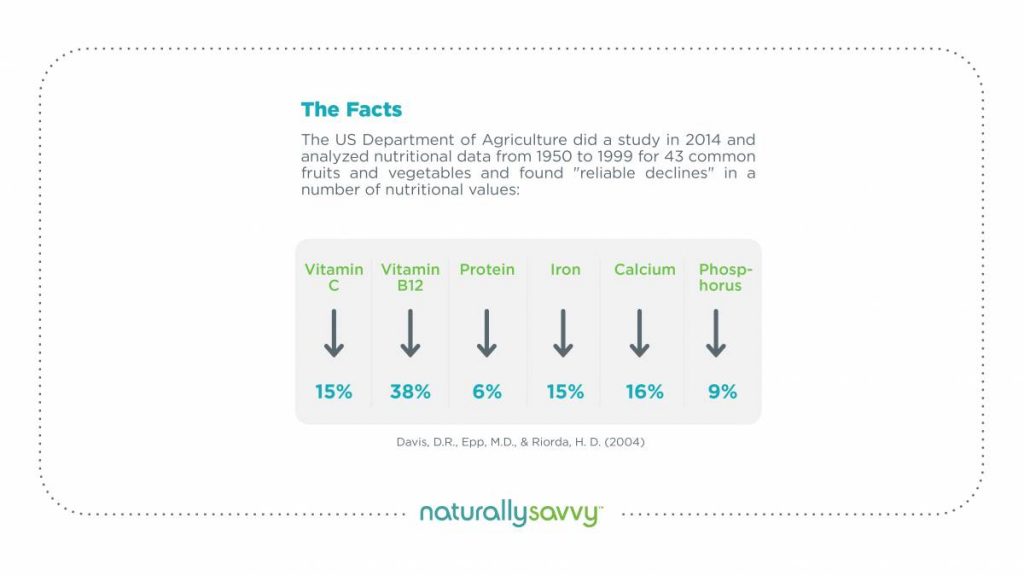
Based on data from a USDA study of 43 garden crops, a comparison of nutritional content in 1950 versus 1999 showed a 6 to 38 percent decline in some important nutrients, such as calcium iron, riboflavin, vitamin C, and phosphorus. Other research has shown that levels of nitrogen and sulfur had dropped by 42 and 33 percent, respectively.
When crops don’t have enough of certain nutrients such as phosphorus, nitrogen, and sulfur, photosynthesis is compromised. These nutrients are also necessary for making protein, enzymes, and more. The end result can be fruits, vegetables, nuts, grains, and more crops that are deficient in vital nutrients.
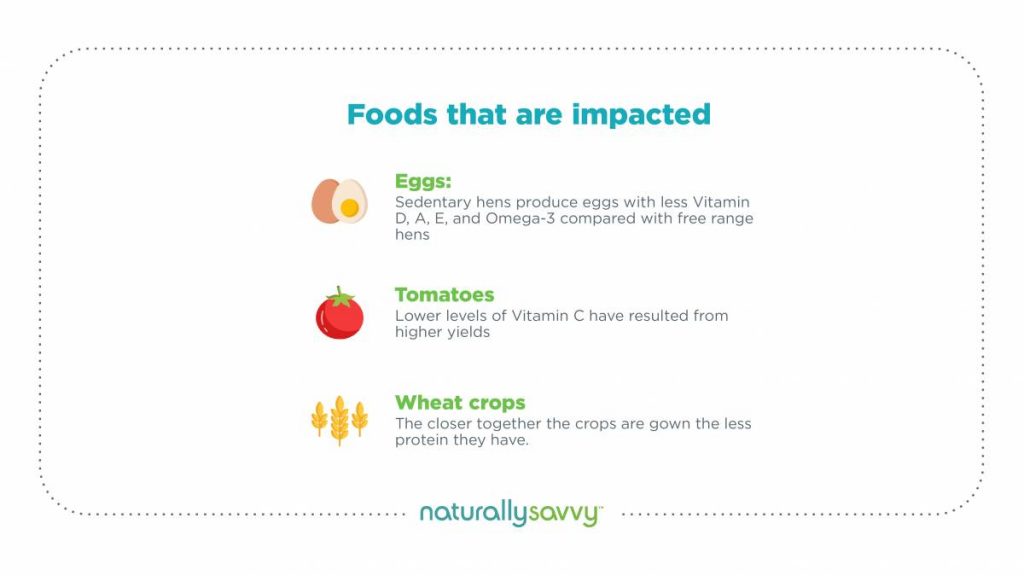
Conventional vs organic farming
One of the best ways to help prevent soil depletion is to practice sustainable, organic farming. The majority of crops, however, are grown conventionally. Conventional farmers use pesticides, herbicides, and fungicides to fight pests, infections, and weeds as well as use synthetic fertilizers to provide nutrition to their crops.
Read about top 10 reasons to eat organic
The use of synthetic pest control products may seem like a good way to control weeds and pests, but pesticides, herbicides, and fungicides also destroy beneficial microbes in the soil. They are associated with numerous acute and chronic health problems, including neurological and reproductive disorders, asthma, eye and skin irritation, nausea, vomiting, diarrhea, loss of consciousness, extreme weakness, and seizures. Chronic or long-term exposure has been associated with Parkinson’s disease, depression, attention and hyperactivity disorder, and cancer.
Synthetic products also can interfere with pollination by damaging honeybee and butterfly populations. This interference can have a devastating impact on crops worldwide.
When synthetic, inorganic fertilizers are applied to crops, they destroy the beneficial microbes in the soil. The nitrogen in these fertilizers also leaves residues, such as ammonia and nitrate, which eventually make their way into rivers, groundwater, and the oceans, where they are dangerous to aquatic life.
Organic farming relies on natural approaches—both modern ones and those used by farmers from centuries past–such as composing, rotational grazing, cover crops, crop rotation, beneficial insects for pest control, and planting cycles adapted to the location to maintain healthy soil and to produce nutritious food.
In a nutshell, “Conventional and organic farming methods have different consequences on the environment and people. Conventional agriculture causes increased greenhouse gas emissions, soil erosion, water pollution, and threatens human health,” according to the Rodale Institute, while “Organic farming has a smaller carbon footprint, conserves and builds soil health, replenishes natural ecosystems for cleaner water and air, all without toxic pesticide residues.”
Read about the truth about organic farming and why it matters
What can you do about soil depletion?
- You are not powerless against soil depletion! One thing you can do is talk with your wallet. When you support farmers who practice organic, sustainable farming, you are saying that such healthy foods matter for your health and that of your family, the farmers, and the planet. Go to farmers' markets, buy organic, and visit the local produce section of grocery stores.
- Much can be said about growing your own produce and herbs. Naturally, this isn’t possible for everyone, but even apartment dwellers can have standing and hanging pots with some fruits, vegetables, and herbs. If you have a patio or lawn area, growing some of your own food can be not only nutritious but gratifying as well. Many urban areas have neighborhood gardens where residents can stake out a plot and grow produce for their families. Making your own compost is highly recommended to provide the best nutrients for your soil.
- When you choose your local, organic produce, be sure to eat a wide variety of colors daily. Explore white mushrooms, red tomatoes, leafy greens, yellow squash, blueberries, and eggplant, for example. When you eat the rainbow, you get diversity in your diet and a better chance of getting the nutrients you need.
- Don’t forget quality supplements. Even the best intentions may leave you lacking in various nutrients. That’s when you need to consider adding nutritional supplements to your daily routine. Take an inventory of your dietary habits for several days and identify which nutrients you may need to add.
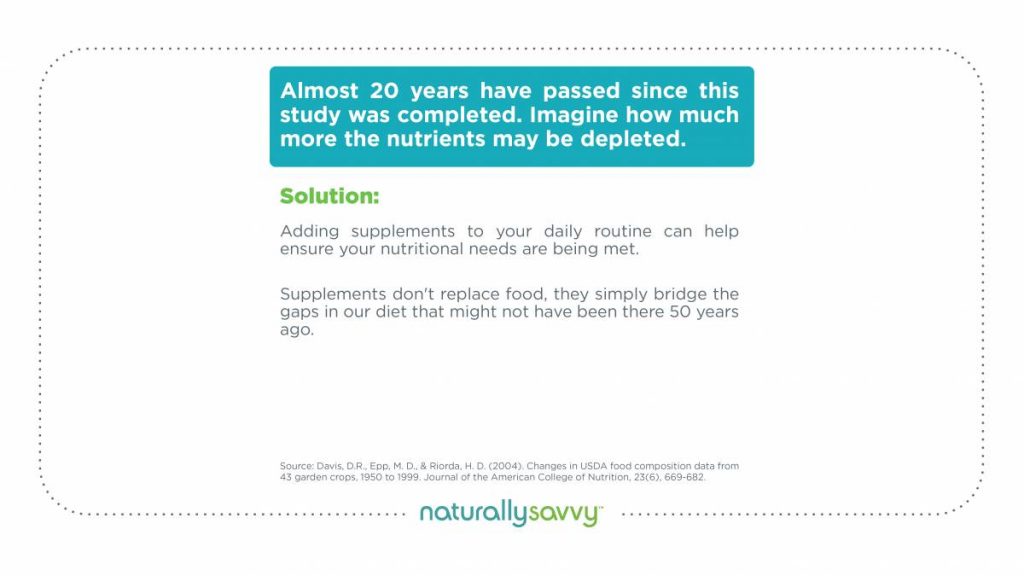
Bottom line
Soil depletion is a serious global problem that has an impact on human health and the environment. Each of us can do our part by supporting local, organic farmers, eating a wide variety of organic foods, taking supplements when needed, and growing our own food when possible.



![[Savvy Swap] – Popsicles Savvy Swap Popsicles Uncle Matt's Probiotic Pops](https://naturallysavvy.com/wp-content/uploads/2020/07/804-Popsicles-IG-with-ingredients-07102020-218x150.jpg)


